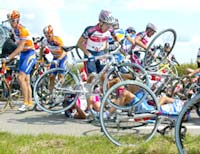Tour de France claims first casualties
Francois Thomazeau
Belgian champion Tom Steels became the first rider to quit the 2002 Tour de France when he gave up halfway through the 195-km fifth stage.
But he was soon joined by compatriot Rik Verbrugghe and Italy's Marco Pinotti who were both injured in a crash towards the end of the stage.
Mapei sprinter Steels, three times Belgian champion and winner of nine stages in the Tour, got off his bike between Soissons and Rouen after he realised he was too weak to go for victory this season.
"He had no strength and decided it was useless going on," said Mapei team director Serge Parsani.
 Pinotti was the most seriously hurt rider in the mass crash which involved about 20 of the peloton 30 kms from the finish.
Pinotti was the most seriously hurt rider in the mass crash which involved about 20 of the peloton 30 kms from the finish.
The Lampre Daikin rider lay unconscious on the road for several minutes after coming off his bike. He was taken to hospital and has a broken nose but no brain damage was diagnosed.
Verbrugghe finished the stage but was later found to have broken his collarbone. He will need an operation on the injury.
Prior to Thursday's stage, race doctor Gerard Porte had said he had never had such an idle first week.
"In other Tours, we usually have lots of crashes in the first couple of stages," said the veteran of some 25 Tours.
Credit Agricole leader Christophe Moreau crashed twice in the first stage, Bonjour team leader Didier Rous also slipped in the prologue while Australian Stuart O'Grady had a fit of rapid heart-beats, but all were able to continue unhurt.
"There were some bruises, but never serious ones," Porte said.
RATHER COOL
Porte said the weather, which has so far been rather cool but without heavy rain, has helped a lot. Very warm weather was the worst for riders as they did not sleep well and were often affected by digestive problems.
In case of windy or cold weather, bronchitis becomes a very common illness.
"But these problems usually appear after the first week because most of the riders come on the Tour in their best form, this being the main objective of their season," Porte said.
The relatively low number of crashes could also be explained by the security measures taken by organisers.
They have tried to avoid roundabouts and obstacles on the road in their itinerary and these are much better signalled than they used to be.
"The security of riders is the number one concern for organisers and lots of things have been achieved through the years.
"Last year for instance, they tried to have a sound signal to indicate obstacles but it did not go down well with the riders," Porte said.
This year, on top of the barriers and straw bags placed around kerbs and roundabouts, police officers signal the main obstacles and curves with a whistle.